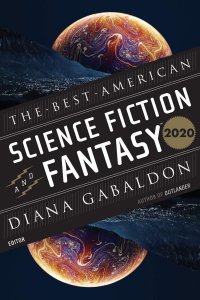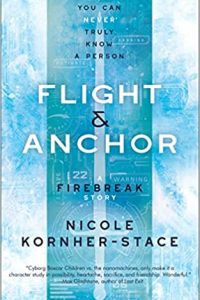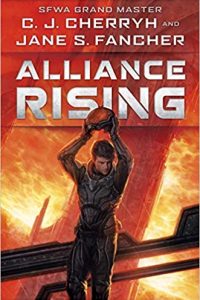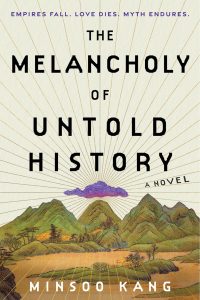Gary K. Wolfe Reviews The Best American Science Fiction and Fantasy 2020, Edited by Diana Gabaldon & John Joseph Adams
 The Best American Science Fiction and Fantasy 2020, Diana Gabaldon & John Joseph Adams, eds. (Mariner 978-1328613103, $16.99, 432pp, tp) November 2020.
The Best American Science Fiction and Fantasy 2020, Diana Gabaldon & John Joseph Adams, eds. (Mariner 978-1328613103, $16.99, 432pp, tp) November 2020.
It’s always seemed to me that John Joseph Adams’s Best American Science Fiction and Fantasy series, now in its sixth volume, has served a somewhat different if equally important purpose than the more traditional year’s best volumes which have been a staple of SF publishing for more than 70 years. While those volumes have historically been SF’s way of presenting itself to itself (always with the hopes of drawing a broader readership among those who simply want to check in on SF from time to time), Adams’s annual volumes are part of the “Best American” series of focused anthologies which began with Best American Short Stories over a century ago and began adding more specific genres in the 1980s and 1990s; SF/F is a rather latecomer to that venerable tradition. One aspect that carries over to Adams’s series is the recruitment of celebrity guest editors, who would make a final selection from a larger group of stories chosen by the series editor – often 120 in the case of Best American Short Stories, 80 in Adams’s case. This year’s co-editor is Diana Gabaldon of Outlander fame, who selected 20 stories, ten fantasy and ten SF (although, if the last several years should prove anything, it’s that this is often a difficult line to draw, as Gabaldon acknowledges). As always, the guest editor read the stories blind, without knowing author or original venue. In Gabaldon’s intelligent and generally charming introduction (in which she reveals that her grandfather was an obscure pulp writer named Harold Sykes), she speaks as someone who once read a good deal of SF/F and still thinks of it in terms of familiar tropes like Doomed Earth, Escaping Spaceships, alien invasions, etc. The result is a selection that should thoroughly satisfy the occasional SF reader, while only occasionally overlapping with other annuals (for the record, five of these stories also appear in Jonathan Strahan’s annual, only one in Rich Horton’s, and none in Neil Clarke’s).
On the fantasy side of the ledger, several stories are pointedly in dialogue with older traditions or texts. One of the best, Kelly Barnhill’s “Thirty-Three Wicked Daughters”, draws upon an early British creation myth of Albina and her sisters murdering their treacherous husbands and turns it into an ingenious revenge fable of feminism and liberal humanism, while Gwendolyn Kiste’s “The Eight People Who Murdered Me (Excerpt from Lucy Westenra’s Diary)” adds a similar theme of female agency and victimization to the unfortunate Lucy from Stoker’s Dracula. In “Up from Slavery”, Victor LaValle touches upon Lovecraft once again (as he did in The Ballad of Black Tom), this time borrowing figures from “At the Mountains of Madness” in a suspenseful tale whose narrator, a copyeditor working on a new edition of the Booker T. Washington classic, inherits a ramshackle house from his estranged hoarder father and meets a strange figure on the train there, resulting in a spectacular disaster with ominous overtones. Christopher Caldwell’s account of a cursed whaling ship, “Canst Thou Draw Out the Leviathan”, inevitably evokes aspects of Moby-Dick, though with a powerful slavery subtheme, while Jaymee Goh, in “The Freedom of the Shifting Sea”, finds a way of radically reinventing the mermaid tale in genderqueer terms by presenting it as a version of a real-life creepy-crawly called a Bobbitt worm. E. Lily Yu’s “The Time Invariance of Snow” – one of those stories that challenges the line between SF and fantasy – turns Andersen’s “The Snow Queen” into a sophisticated fragmentary narrative involving physics, the Devil’s mirror, and women’s agency (or lack of it). It’s one of the few selections that openly experiments with narrative form; another is Nibedita Sen’s “Ten Excerpts from an Annotated Bibliography on the Cannibal Women of Ratnabar Island”, which uses the form of an annotated bibliography to unfold a tale of imperialism, racism, and (again) feminine agency, all while offering a witty skewering of academia. For sheer joyful wit, though, the most delightful fantasy story comes from The New Yorker – Rion Amilcar Scott’s manic take on the Samson and Delilah tale, cast in terms of witches, a “Great Hair Crisis” of disastrous haircuts in a Maryland town, and the traditional role of the barbershop in Black communities.
Generally, the SF selections feel a bit more conservative. Probably the most conceptually sophisticated is Carolyn Yoachim’s “The Archronology of Love” – the only story to also make it into Strahan’s and Horton’s volumes, and a finalist for the Hugo, Nebula, and Sturgeon awards. It’s a beautifully written exploration of memory, loss, and the fragility of the past, but one that begins with the familiar trope of a mysterious plague on a colony planet. Similarly, the memory wipe as punishment for criminals is hardly a new idea, but Matthew Baker gives it an unusually sensitive treatment in “Life Sentence”, just as Anil Menon offers a humanistic and ultimately chilling take on the idea of artificial brain augmentation in “The Robots of Eden”. The idea of posthumous survival in electronic form is the SF engine of Rebecca Roanhorse’s “A Brief Introduction to Native American Astronomy”, but Roanhorse presents it in the context of media celebrity and, in particular, the media stereotypes of Native Americans. Elizabeth Bear even returns to a last-woman-on-Earth scenario in “Bullet Point”, but adds a dimension of playful irony by setting it in Las Vegas and dressing up the narrative with a witty use of actual bullet points. Bear is the only author with two stories here; the other, “Erase, Erase, Erase”, is another one that challenges the F/SF divide, with its narrator actually losing pieces of herself in a theater-of-the-absurd manner but also learning of a possible impending terrorist attack. Space travel as a theme hardly shows up at all in the anthology, but Deji Bryce Olukotun’s “Between the Dark and the Light” raises interesting questions of what values we regard as non-negotiable, even in a project of saving the species, but also turns on an equally interesting question of cultural drift – a common theme in generation-starship stories.
Not everything is so grim, and Tobias S. Buckell’s portrayal of a future New York as a galactic tourist center in “The Galactic Tourist Industrial Complex” recalls Sheckley’s mordant satire, while Charlie Jane Anders’s “The Bookstore at the End of America” opens with perhaps the most conventionally dystopian scenario here – a repressive America at odds with a liberal, separatist California – but ends as a kind of celebration of the unifying power of books. Even Adam-Troy Castro’s “Sacrid’s Pod”, initially set up as a grim horror story whose rebellious protagonist is imprisoned and paralyzed in a pod managed by an almost all-powerful AI hired by a draconian religious family, turns out to be a classic puzzle-solving tale. But what may be the most genuinely disturbing story in the anthology is also one of the closest to home. Ken Liu’s “Thoughts and Prayers”, as its bitterly ironic title suggests, begins with a victim of a mass shooting whose family find themselves dealing with her memorial being turned into an online obscenity by vicious trolls who sound all too familiar. It’s also in Strahan’s annual, but perhaps more tellingly it’s the only story here to also appear in Paula Guran’s Year’s Best Dark Fantasy and Horror. Like the best of The Best American Science Fiction and Fantasy, it’s distinguished as much by the precision and elegance of its writing as by its ideas, and if that reflects Gabaldon’s tastes in making the final selections from the titles that Adams provided her, it’s not a bad way to make choices.
Gary K. Wolfe is Emeritus Professor of Humanities at Roosevelt University and a reviewer for Locus magazine since 1991. His reviews have been collected in Soundings (BSFA Award 2006; Hugo nominee), Bearings (Hugo nominee 2011), and Sightings (2011), and his Evaporating Genres: Essays on Fantastic Literature (Wesleyan) received the Locus Award in 2012. Earlier books include The Known and the Unknown: The Iconography of Science Fiction (Eaton Award, 1981), Harlan Ellison: The Edge of Forever (with Ellen Weil, 2002), and David Lindsay (1982). For the Library of America, he edited American Science Fiction: Nine Classic Novels of the 1950s in 2012, with a similar set for the 1960s forthcoming. He has received the Pilgrim Award from the Science Fiction Research Association, the Distinguished Scholarship Award from the International Association for the Fantastic in the Arts, and a Special World Fantasy Award for criticism. His 24-lecture series How Great Science Fiction Works appeared from The Great Courses in 2016. He has received six Hugo nominations, two for his reviews collections and four for The Coode Street Podcast, which he has co-hosted with Jonathan Strahan for more than 300 episodes. He lives in Chicago.
This review and more like it in the December 2020 issue of Locus.
 While you are here, please take a moment to support Locus with a one-time or recurring donation. We rely on reader donations to keep the magazine and site going, and would like to keep the site paywall free, but WE NEED YOUR FINANCIAL SUPPORT to continue quality coverage of the science fiction and fantasy field.
While you are here, please take a moment to support Locus with a one-time or recurring donation. We rely on reader donations to keep the magazine and site going, and would like to keep the site paywall free, but WE NEED YOUR FINANCIAL SUPPORT to continue quality coverage of the science fiction and fantasy field.
©Locus Magazine. Copyrighted material may not be republished without permission of LSFF.






